逆向物流论文
逆向物流行业报告分析论文

逆向物流行业报告分析论文引言随着电子商务的兴起和消费者权益保护意识的提高,逆向物流行业得到了迅速发展。
逆向物流是指商品从消费者回到供应链的过程,涉及退货、退款、退款等操作。
本文将对逆向物流行业的发展现状进行分析,并探讨其影响因素和未来发展趋势。
远程购物驱动了逆向物流行业的发展随着跨境电子商务的普及和在线购物的便利性,消费者越来越多地选择通过远程购物方式满足其购物需求。
然而,这种购物方式也给逆向物流行业带来了挑战。
远程购物使得消费者在未亲自体验商品的情况下下单购买,因此存在一定的不确定性。
当消费者收到的商品与期望不一致时,就会触发逆向物流过程,消费者需要退货、退款等操作。
因此,远程购物的普及推动了逆向物流行业的发展。
消费者权益保护政策加速了逆向物流行业的发展逆向物流行业的发展除了远程购物的普及外,还得益于消费者权益保护政策的加强。
越来越多的政府和组织开始关注消费者权益保护,并加强监管力度。
消费者权益保护政策的加强使得逆向物流行业更加规范化和标准化。
例如,一些国家要求电子商务平台提供方便快捷的退货退款政策,从而保障消费者的权益。
这些政策的实施使得逆向物流行业得到了迅速发展。
逆向物流行业面临的挑战然而,逆向物流行业也面临着一些挑战。
首先,逆向物流过程需要花费大量的时间和资源。
例如,商品的退货、处理和重新上架等环节都需要人力和物力的支持,这增加了企业的成本和压力。
其次,逆向物流行业还存在着信息不对称的问题。
消费者在进行逆向物流操作时,常常面临信息不清晰、流程繁琐等问题,从而影响到消费者的体验。
此外,逆向物流行业的发展对供应链管理提出了更高的要求,企业需要建立起高效的逆向物流网络,以更好地应对逆向物流的挑战。
逆向物流行业的未来发展趋势尽管逆向物流行业面临着一些挑战,但其发展前景依然广阔。
首先,随着消费者权益保护政策的不断加强,未来逆向物流行业将更加规范化和标准化。
其次,随着技术的进步,逆向物流过程将更加智能化和自动化。
论文 逆向物流
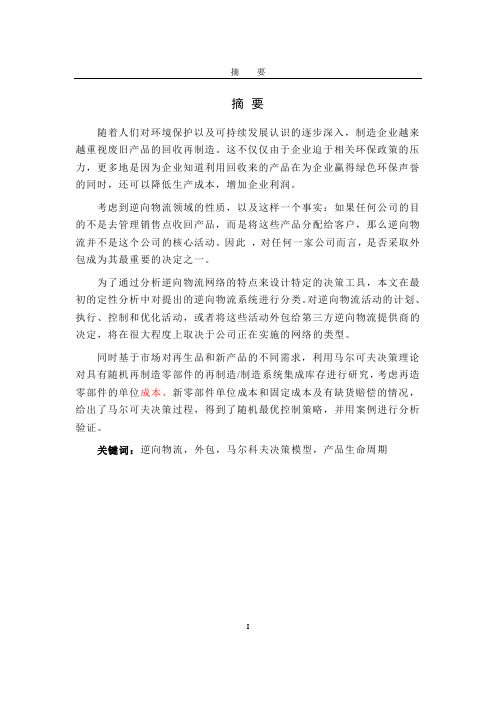
摘要随着人们对环境保护以及可持续发展认识的逐步深入,制造企业越来越重视废旧产品的回收再制造。
这不仅仅由于企业迫于相关环保政策的压力,更多地是因为企业知道利用回收来的产品在为企业赢得绿色环保声誉的同时,还可以降低生产成本,增加企业利润。
考虑到逆向物流领域的性质,以及这样一个事实:如果任何公司的目的不是去管理销售点收回产品,而是将这些产品分配给客户,那么逆向物流并不是这个公司的核心活动。
因此,对任何一家公司而言,是否采取外包成为其最重要的决定之一。
为了通过分析逆向物流网络的特点来设计特定的决策工具,本文在最初的定性分析中对提出的逆向物流系统进行分类。
对逆向物流活动的计划、执行、控制和优化活动,或者将这些活动外包给第三方逆向物流提供商的决定,将在很大程度上取决于公司正在实施的网络的类型。
同时基于市场对再生品和新产品的不同需求,利用马尔可夫决策理论对具有随机再制造零部件的再制造/制造系统集成库存进行研究,考虑再造零部件的单位成本、新零部件单位成本和固定成本及有缺货赔偿的情况,给出了马尔可夫决策过程,得到了随机最优控制策略,并用案例进行分析验证。
关键词:逆向物流,外包,马尔科夫决策模型,产品生命周期IAbstractAs people's awareness of environmental protection and sustainable development gradually deepen, manufacturers put emphasis upon recycling waste products and remanufacturing. It is not only because the corporations are forced by the relevant environmental protection policies, but also they find using recycled products can obtain the reputation of environmental protection, the reduction of costs and the improvement of profits.Given the nature of the RL field, one of the most important decisions to be taken by any firm is either to outsource such functions or not. This comes from the fact that RL does not represent a core activity for a firm, given that the purpose of any company is not to manage the flow of products taken back from the sale point, but rather to distribute such products to its customers.The RL systems classification that is initially proposed in the qualitative analysis of this document, is an attempt to develop particular decision-making tools according to the characteristics of the RL network under analysis. The planning, executing, controlling and optimizing activities performed in a RL system, or the decision to outsource these activities to a 3PRLP, will largely depend on the type of network that the firm is dealing with.Considering the different demands of remanufactured ang new products,the intergrating inventory system with stochastic remanufactured parts is studied by using Markow Decision Processes.A stochastic optimal control strategy is presented based on the unit cost of remanufactured and new parts,and fixed cost of new parts,and backorder costs.Illustration is given through a case study.Key words:Reverse Lgistics , Outsourcing , Markov Decision Model,Product Life CycleII目录摘要 (I)Abstract (II)目录 ..................................................................................................... I II 第一章绪论 (1)1.1 研究背景与意义 (1)1.1.1 现实背景 (1)1.1.2 理论背景 (1)1.1.3 研究意义 (2)1.2 问题的提出与研究内容 (3)1.2.1 问题的提出 (3)1.2.2 研究内容 (3)1.3 研究方法及思路 (4)1.3.1 本论文研究方法 (4)1.3.2 研究思路 (4)1.4 研究假设和目的 (6)第二章逆向物流网络的分类 (7)2.1 研究对象以及相关问题界定 (7)2.1.1 逆向物流网络的特点 (7)2.1.2 逆向物流网络分类因素 (8)2.1.3 产品生命周期 (9)2.1.4 回收量的可变性 (10)2.2各种情景下的产品类型分析 (12)2.3 逆向物流网络分类 (13)2.4 每种情况存在的第三方逆向物流供应商 (15)第三章马尔可夫决策模型 (17)3.1 模型定义 (18)3.1.1 决策时期 (18)3.1.2 状态 (19)III3.1.3 行为 (19)3.1.4 转换概率 (19)3.1.5 报酬 (20)3.2 系统动态 (22)3.3 最优政策的特点 (23)3.4 马尔可夫决策模型中存在单调不递减政策(MNP)的要求 (24)3.5 具有较高回收量可变性情况下外包合适性的含义 (29)第四章数值算例 (31)结论 (34)参考文献 (35)致谢 (36)附录 (37)IV第一章绪论1.1 研究背景与意义1.1.1 现实背景产品回收的原因有很多,主要原因来自消费者或者流通链上的相关公司。
基于电子商务的逆向物流发展论文

基于电子商务的逆向物流发展论文一、我国现阶段逆向物流发展现状及逆向物流的作用(一)逆向物流在我国的发展现状现阶段,随着电子商业的发展,我国逆向物流的发展也在不断前进。
但是,我国的逆向物流还处于初级阶段,无论是从法律法规、产品信息、消费者、竞争者以及物流本身等方面都还不健全。
徐建国等人分析、探讨我国逆向物流协同发展在质量管理水平、退换货周期、库存管理等方面存在的优劣势,从而积极探讨逆向物流协同发展的可实施策略。
另外,与国外发达国家相比,我国企业对逆向物流的重视力度不够,很多电子商务企业的逆向物流意识淡薄,再加上第三方物流在我国发展的不成熟,我国很多的第三方物流企业缺乏逆向物流服务,而且我国对逆向物流的知识系统的研究比较少。
这些原因致使我国的逆向物流发展存在一定的障碍,需要加大管理来提高逆向物流的发展。
(二)电子商务环境下逆向物流发展的作用1.有利于增加效益电子商务式的交易与传统的交易方式不同,传统的交易方式,消费者可以实实在在的感受到商品。
但是,电子商务下的交易,消费者只能通过商品的图片、文字描述以及消费者的评价来了解商品的大致,对商品的质量问题、尺寸大小很难有直观的了解。
所以,在交易中肯定会因为种种原因出现退货的现象,否则,肯定会造成商品的浪费。
08年电子商务交易额达到1281.8亿元,据统计,顾客对商品不满意的机会,会随着网购商品人数的增多而增加,而逆向物流,能有效商品回收,增加商品的再利用价值,减少浪费,提高社会效益。
2.促进物流业的发展壮大电子商务的迅速的发展,极大地方便了顾客的消费,但是,同时也带来了大量的退货,这是就需要逆向物流发挥起作用,对产品进行回收再利用。
随着电子商务规模的扩大,必然会产生很基于电子商务的逆向物流发展策略文/陶杰高的退货率,这对于物流业来说是一个很好的发展机会,完善的物流以及逆向物流,能有效的推动整个物流产业链的发展。
3.有利于建立顾客忠诚度电子商务环境下,商家经营信誉与服务水平,是通过消费者的满意度表现出来的,顾客价值是电子商务企业的最佳竞争优势。
逆向物流论文企业逆向物流论文

首先对逆流物的规模进行有效预测,但逆向物流的预 测比新产品的预测复杂得多,在对逆流物规模有效预 测的基础上才能确定逆向物流的规模,进行适当的投 入,避免资源浪费和设施闲置情况的出现。 本文根据 逆向物流的特性,提出一种对逆流物预测相对有效的 方法— ——双系数法,包括消费系数、回收系数 和扩大 系数。由于扩大系数确定相对简单,故称为双系数法,
从逆流物的特性可以看出,要想对逆流物进行非 常精确地进行预测存在很大的困难,笔者提出双系数 法。 为了预测方便和简化计算,笔者做出以下假设:
(1)引入单位当量的概念。 所谓单位当量是指在 预测产品或其某一部分时,把预测对象都换算为其新 品时的质量状态或数量状态来处理,如果一些逆流物 不具备其新品时的质量状态或数量状态,就把两个或 多个组合换算成其新品时的质量状态或数量状态,在 真正回收时和回收后才会把它们进行分类,决定其具 体用途是直接利用还是维修利用、资源回收和合理处 置等。
βt
1 βt1
0
Pe Pf
P
图 2 回收系数βt 与回收激励水平P 的关系曲线图
<0,P≤0
<
βt=<P n,0<P≤Pf
(3)
<
<(P-Pf)1/n+1,Pf<P
式中:
P—是回收激励水平,是企业采取一定的回收激
励措施以提高回收积极水平 Q 而达到的回收效果;
Pf—是回收系数等于 1 时的激励水平; n—是 差 别 系 数 ,其 大 小 由 产 品 特 性 决 定 , 不 同 行业、不同类型产品的 n 值 不同,可以通过专家或
逆向物流论文
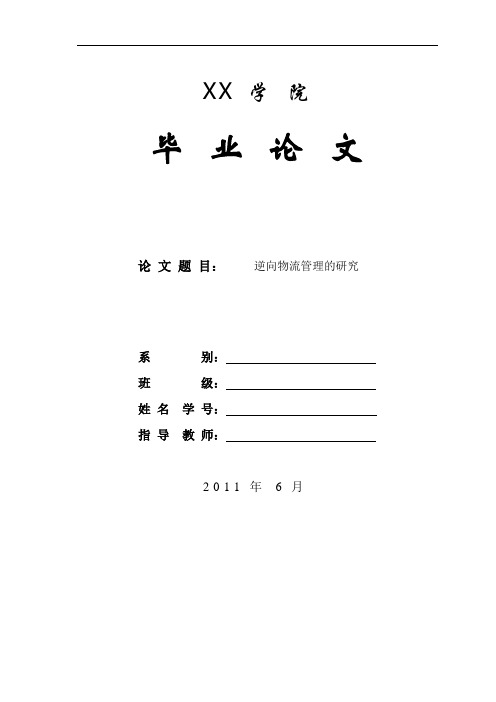
XX 学院毕业论文论文题目:逆向物流管理的研究系别:班级:姓名学号:指导教师:2011年6月逆向物流管理的研究摘要逆向物流是物流业中的循环再利用,是包含了产品退回、物品再利用、废弃处理、维修和再制造等流程的物流活动。
逆向物流是在绿色物流的基础上发展出来的,具有良好的生态效益和经济效益。
逆向物流在国民经济中起到的是一个过渡的作用,将产品从销售再到回收在销售的过程。
基于此,逆向物流对于循环经济具有十分重要的作用。
21世纪人类想要实行可持续发展的战略,那么逆向物流是我们不能忽视的方面,只有将逆向物流与正向物流完整的结合在一起才能构建一个可持续发展的经济,人类才能可持续发展。
逆向物流是一个需要我们共同参与的活动,它不仅仅是一种经济活动,更是一种人类对可持续发展认识的活动。
只有真正将产品的销售与回收结合起来才能够更好的实现可持续发展。
我们的资源会得到尽可能充分的利用,而不是任意的浪费。
我们的企业在销售时同时注意产品的售后服务,这就是注重逆向物流的一种体现。
现在的消费者不仅重视产品的价格质量,对售后服务也是十分重视。
企业重视逆向物流会给企业带来不可忽视的利益,使企业的正向物流更加通畅,即商品更容易的获得消费者的认同,消费者的购买意愿会随之增加,逆向物流会为企业带来巨大的经济利益。
本文首先分析了逆向物流的作用,阐述了发达国家和我国逆向物流的情况,着重介绍了逆向物流业发展的现状以及未来发展的趋势。
探讨了逆向物流在我国未来发展的趋势以及对我国企业发展逆向物流的建议。
关键词:逆向物流,SWOT分析,供应链Reverse logistics management researchAbstractThe reverse logistics is the recycling logistics industry, including products returned and articles reuse, waste processing, maintenance and remanufacturing wait for flow the logistics services. In the reverse logistics is the basis of the development of green logistics for out, and has good ecological benefits and economic benefits. Reverse logistics in the national economy plays the role of is a transition from selling products, will again to recovery in sales process. Based on this, the reverse logistics for circular economy is very important role. The 21st century humans want to implement the strategy of sustainable development, then reverse logistics is we cannot ignore the problems, only will reverse logistics and positive logistics complete together to build a sustainable economic, human beings to sustainable development.Reverse logistics is a need to participate in our common activity, it is not only a kind of economic activity, is also a kind of human understanding of sustainable development of activities. Only truly will product sales combined with recovery can only good realize sustainable development. Our resources will get full use of as much as possible, rather than anywhere waste. Our enterprise in sales is also note the product post-sale service, this is pay attention to an embodiment of reverse logistics. Today's consumers not only the price of importance to product quality and after-sales service are also consumers one aspect of the very seriously. Enterprise attention to reverse logistics will brings to the enterprise, cannot ignore the interests of enterprise is more unobstructed, positive logistics is easier to obtain consumer goods of identity, consumers' willingness to buy will increase for enterprise bring huge economic benefits.This paper first analyzes the role of reverse logistics, this paper expounds the developed country and our reverse logistics, this paper introduces the present situation of the development of reverse logistics industry and the future development trends. Discuss the revising logistics in our future development trends and for our country enterprise development revising logistics proposal.Keywords: reverse logistics, SWOT analysis, supply chain目录1引言 (5)2发达国家逆向物流业发展分析 (6)2.1逆向物流的基本概念及逆向物流的发展意义 (6)2.1.1逆向物流的基本概念 (6)2.1.2发展现代逆向物流的意义 (7)2.2发达国家逆向物流业发展的分析和发展的趋势 (7)2.3发达国家发展城市逆向物流的经验总结 (8)3我国城市逆向物流业发展现状分析 (10)3.1我国城市逆向物流业发展现状与国内城市物流发展简介 (10)3.2城市逆向物流发展的意义及必要性 (10)4逆向物流业的发展现状分析和未来物流需求量预测 (12)4.1逆向物流业发展状况 (12)4.2逆向物流产业规模 (12)4.3逆向物流需求量预测分析 (12)5 逆向物流业发展的SWOT分析和措施与建议 (13)5.1逆向物流业发展优势分析 (13)5.2逆向物流业发展的目标和指导思想 (13)5.3逆向物流业发展的措施与建议 (13)5.3.1加强对逆向物流产业的管理 (13)5.3.2改造提升现有逆向物流企业 (14)5.3.3积极进行宣传推广,加大逆向物流招商引资力度 (14)5.3.4加强逆向物流人才培养 (15)5.3.5大力发展逆向物流 (15)谢辞 (17)参考文献 (18)外文资料 (19)1引言近年来,随着物流业的蓬勃发展,逆向物流也越来越受到人们的重视。
逆向物流学士学位论文
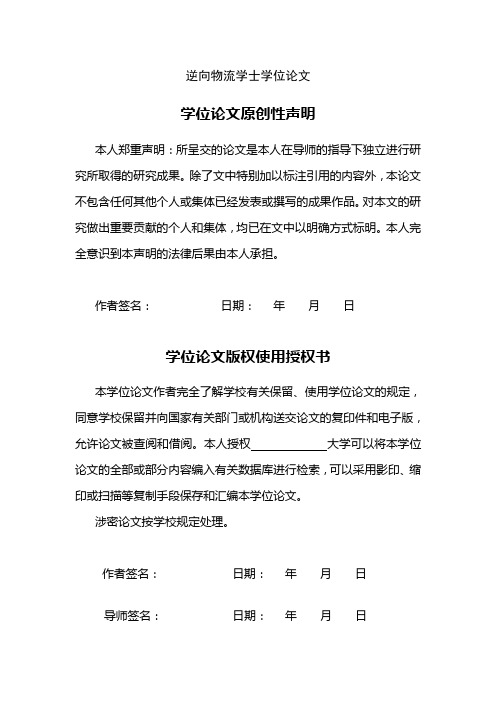
逆向物流学士学位论文学位论文原创性声明本人郑重声明:所呈交的论文是本人在导师的指导下独立进行研究所取得的研究成果。
除了文中特别加以标注引用的内容外,本论文不包含任何其他个人或集体已经发表或撰写的成果作品。
对本文的研究做出重要贡献的个人和集体,均已在文中以明确方式标明。
本人完全意识到本声明的法律后果由本人承担。
作者签名:日期:年月日学位论文版权使用授权书本学位论文作者完全了解学校有关保留、使用学位论文的规定,同意学校保留并向国家有关部门或机构送交论文的复印件和电子版,允许论文被查阅和借阅。
本人授权大学可以将本学位论文的全部或部分内容编入有关数据库进行检索,可以采用影印、缩印或扫描等复制手段保存和汇编本学位论文。
涉密论文按学校规定处理。
作者签名:日期:年月日导师签名:日期:年月日目录摘要 ..................................................................................错误!未定义书签。
Abstract .........................................................................错误!未定义书签。
第一章绪论 (1)1.1研究背景和意义 (1)1.2国内外研究现状 (4)1.2.1国内的研究现状 (4)1.2.2国外的研究现状 (5)1.3研究范围 (5)第二章逆向物流的概述 (7)2.1逆向物流的概述 (7)2.1.1逆向物流的定义 (7)2.1.2逆向物流的内涵 (7)2.2逆向物流与正向物流的区别与联系 (8)2.2.1逆向物流与正向物流的区别 (8)2.2.2逆向物流与正向物流的联系 (11)2.3逆向物流的分类 (12)2.3.1根据业务范围分类 (12)2.3.2根据回收后处理方式方法分类 (13)第三章逆向物流的运作模式 (15)3.1企业自营的逆向物流模式 (15)3.3.1企业自营的逆向物流模式概述 (15)3.1.2企业自营的逆向物流模式的优缺点 (16)3.1.3企业自营的逆向物流模式可适用的条件与范围 (17)3.2企业联合经营逆向物流模式 (17)3.2.1企业联合经营逆向物流模式概述 (17)3.2.2企业联合经营逆向物流模式的优缺点 (18)3.2.3企业联合经营逆向物流模式可适用的条件与范围 (20)3.3企业外包逆向物流模式 (20)3.3.1企业外包逆向物流模式概述 (20)3.3.2企业外包逆向物流模式的优缺点 (21)3.3.3企业外包逆向物流模式可适用的条件与范围 (22)第四章逆向物流模式的选取 (1)4.1逆向物流模式的联系与区别 (1)4.1.1不同企业逆向物流运作方式选择的案例分析 (1)4.2逆向物流模式选取发展历程 (4)4.3建立选取逆向物流模式的模型 (5)4.3.1层次分析法AHP概述 (5)4.3.2层次分析法AHP原理 (6)4.3.3 AHP基本步骤 (6)4.3.4建立多层次模型 (8)4.3.4例子 (11)总结与展望 (14)参考文献 (38)致谢 (39)第一章绪论1.1研究背景和意义随着我国经济的飞速发展,“物流”这个词进入了人们的日常生活,同时物流业也随之得到了迅速的发展。
现代企业发展逆向物流论文

现代企业发展逆向物流的思考摘要:逆向物流是物流的重要组成部分,是适应资源、环境、社会、经济的可持续发展的要求,被国际知名企业所重视,而我国企业对逆向物流的认识还不够充分。
本文阐述了逆向物流的概念和类型,分析了我国企业发展逆向物流的制约因素,并针对我国企业发展逆向物流存在的问题提出了新思考。
关键词:逆向物流可持续思考随着我国市场经济的不断完善和发展,企业经营者越来越认识到物流在企业控制成本中的重要作用。
而作为逆向物流,可以认为是物流利润中的一块处女地,其中有很多值得挖掘的利润。
尤其是对于资源日益短缺的今天,构建可持续发展的循环经济模式无疑是目前最抢眼的话题。
在全球一体化化竞争的大环境中,中国企业能否正确认识和发展逆向物流,对企业实现持续发展有着至关重要的作用。
一、逆向物流概述(一)逆向物流的定义“逆向物流”这个名词最早是由stock 在1992 年给美国物流管理协会(clm) 的一份研究报告中提出的。
根据美国物流管理协会(clm) 的定义,逆向物流( reverse logistics ) 就是对由最终消费端到最初的供应源之间的在制品、库存、制成品以及相应的信息流、资金流所进行的一系列计划、执行和控制等活动及过程, 目标是对产品进行适当的处理或者恢复一部分价值。
中国国家标准《物流术语》则将逆向物流分为回收物流和废弃物物流两类。
回收物流(returned logistics):不合格物品的返修、退货以及周转使用的包装容器从需方返回到供方所形成的物品实体流动;二是废弃物物流(waste material logistics):将经济活动中失去原有使用价值的物品,根据实际需要进行收集、分类、加工、包装、搬运、储存,并分送到专门处理场所时所形成的物品实体流动。
(二)逆向物流的类型1、按照回收物品的渠道来分按照回收物品的特点可分为退货逆向物流和回收逆向物流两部分。
退货逆向物流是指下游顾客将不符合订单要求的产品退回给上游供应商,其流程与常规产品流向正好相反。
我国逆向物流的发展现状_本科毕业论文
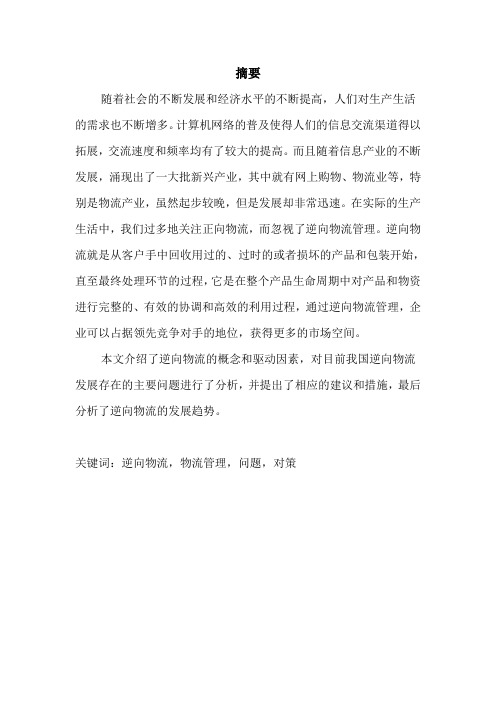
随着社会的不断发展和经济水平的不断提高,人们对生产生活的需求也不断增多。
计算机网络的普及使得人们的信息交流渠道得以拓展,交流速度和频率均有了较大的提高。
而且随着信息产业的不断发展,涌现出了一大批新兴产业,其中就有网上购物、物流业等,特别是物流产业,虽然起步较晚,但是发展却非常迅速。
在实际的生产生活中,我们过多地关注正向物流,而忽视了逆向物流管理。
逆向物流就是从客户手中回收用过的、过时的或者损坏的产品和包装开始,直至最终处理环节的过程,它是在整个产品生命周期中对产品和物资进行完整的、有效的协调和高效的利用过程,通过逆向物流管理,企业可以占据领先竞争对手的地位,获得更多的市场空间。
本文介绍了逆向物流的概念和驱动因素,对目前我国逆向物流发展存在的主要问题进行了分析,并提出了相应的建议和措施,最后分析了逆向物流的发展趋势。
关键词:逆向物流,物流管理,问题,对策第1章逆向物流概述 01.1逆向物流的定义和作用 01.2逆向物流中废旧产品的处理方法 (1)1.2.1重新整修和再次制造 (1)1.2.2维修 (2)1.2.3再利用 (2)1.2.4再销售 (2)1.2.5废弃处理 (3)1.3 逆向物流的驱动因素 (3)1.3.1政府立法 (3)1.3.2日益缩短的产品生命周期 (4)1.3.3新的分销渠道 (4)1.3.4供应链中的力量转移 (5)第2章我国逆向物流发展存在的问题 (5)2.1国民珍惜资源和环境保护的意识相对落后,对逆向物流缺乏认识和重视 (5)2.2逆向物流缺乏规范化管理,安全隐患大 (5)2.3回收网点设置不尽合理 (6)2.4企业传统的退货政策对开展逆向物流的不利影响 (6)2.5物流管理观念有待提升 (6)第3章我国逆向物流的发展对策 (6)3.1 在策略层面的对策 (6)3.2 在具体操作层面的对策 (7)第4章逆向物流的发展趋势 (8)4.1为分解而设计 (8)4.2回收更多的物资 (9)4.3延长产品生命周期 (9)4.4完善的逆向物流网络 (9)4.4.1物理结构 (10)4.4.2财务影响 (10)4.4.3信息技术 (10)结束语 (11)参考文献 (12)致谢 (13)我国逆向物流发展存在的问题及对策对大多数企业来讲,在正向物流系统中创造并持续应用最佳业务实践已经是非常艰巨的挑战了。
我国逆向物流的发展现状和问题研究(论文)

我国逆向物流的发展现状和问题研究摘要逆向物流是一种包含了产品退回、物品再利用、废弃处理、维修和再制造等流程的物流活动。
逆向物流具有良好的生态效益和经济效益,是构建循环型经济的必然选择。
从微观上看,逆向物流具有提高顾客价值、增强竞争优势、降低物料成本、增加企业效益、改善环境行为、塑造企业形象等显性和隐性作用;从宏观上看,逆向物流有利于社会资源的合理流动、节约资源、改善环境和经济的可持续发展等。
21世纪人类要实现可持续发展一定要繁荣逆向物流,与正向物流一起形成一个完整的经济链条,才能逐步构建循环型经济,人类也才能获得真正的可持续发展。
逆向物流活动的实现需要全民的参与,上至法律法规的决策者,下至产品的消费者。
政府在制定法律法规时应注重引导企业加强逆向物流管理,以减少其产品带来的环境污染。
消费者在消费时要注重产品的绿色化和环保化,只有消费者的支持,实施逆向物流活动的企业最终才能获得经济效益,才能促进企业加强逆向物流管理。
企业在实施逆向物流活动时应加强逆向物流的正向控制,在产制环节就尽可能的减少产品的缺陷,从源头上减少逆向物流发生的可能性。
同时,企业应重视逆向物流系统及其网络结构的构建,协调各部门的活动,使流程通畅,从而提高逆向物流效率。
本文首先分析了逆向物流的发展背景和国内外的研究现状,进而论述了逆向物流的概念、分类、特征及其作用,重点阐述了企业实施逆向物流活动的决策过程及如何实施逆向物流管理,探讨了我国逆向物流的发展及其问题所在,并对我国企业如何加强逆向物流管理提出了建议。
关键词:逆向物流,SWOT分析,决策树分析An research into the present development and problems of reverse logistics in our countryAbstractReverse logistics is a kind of logistics activity consisting of product return, recycling, discarding, repairing and reproducing of commodities. Reverse logistics, providing ecological and economic benefits, is the essential choice of building circular economics. From the microscopic point, reverse logistics plays a dominant and recessive role in enhancing customers' value, strengthening the competitive advantages, reducing costs of materials, promoting businesses' benefits, improving environments, and shaping images of businesses. From the macroscopic point, reverse logistics is good for the reasonable flowing of social resources, saving sources, improving environment, the sustainable development of economics and so on. In the 21st century, human beings should prosper the reverse logistics and then make a complete economic chain with combination of the forward logistics in order to realize the sustainable development.The realization of reverse logistics needs the participation of all people, including policy-makers of laws and consumers. During the process of making laws, the government should attach importance to guiding businesses how to strengthening the management of reverse logistics so as to decrease the environmental pollutions brought by products. Whiling consuming, consumers should choose green products. Only with the help of consumers can the businesses operating the reverse logistics obtain economic benefits finally, and improve the management. In this course, businesses are supposed to strengthen the obverse control of reverse logistics, decrease deficient products as much as possible in the process of producing and reduce the possibility of reverse logistics at the very beginning. Meanwhile, they should pay much attention to building the system of reverse logistics and its networks, coordinate with various sectors to make the process smooth.This paper makes an analysis of the development background and the present research of reverse logistics at home and abroad, elaborates its concept, specialization, features as well as effect and focuses on explaining how businesses make decisions in the process of operating reverse logistics activities and how they manage it in detail. Then, it also makes a discussion of our national development of reverse logistics and its problems and puts forward some suggestions of strengthening the management of reverse logistics in our country.Key words:reverse logistics, SWOT analysis, decision tree analysis目录摘要 (I)Abstract (II)一、绪论 (5)二、逆向物流的概述 (7)(一)逆向物流的概念及其发展的驱动因素 (7)1. 逆向物流的概念 (7)2. 逆向物流发展的驱动因素 (8)(二)逆向物流的分类 (9)1. 按回收产品的价值高低分类 (9)2. 按回收产品是否可再利用分类 (10)3. 按逆向物流作用不同分类 (10)(三)逆向物流的特征 (11)1. 逆向物流的复杂性 (12)2. 逆向物流的分散性 (12)3. 逆向物流的不确定性 (12)4. 逆向物流的缓慢性 (12)5. 逆向物流实施的困难性 (13)(四)逆向物流的作用 (13)1. 微观方面 (13)2. 宏观方面 (14)三、逆向物流的实施决策 (15)(一)企业实施逆向物流活动的决策流程 (15)(二) SWOT分析 (17)1. SWOT原理分析 (17)2. 逆向物流的SWOT战略选择 (18)(三)企业实施逆向物流活动的决策树分析 (20)四、逆向物流管理 (22)(一)构建逆向物流系统 (22)1. 系统功能模块 (22)2. 系统流程图及子流程图 (23)(二)逆向物流正向控制 (27)1. 运输 (27)2. 装卸搬运 (28)3. 仓储 (28)4. 流通加工 (28)5. 包装 (29)6. 配送 (29)7. 信息处理 (29)五、我国逆向物流的发展情况 (29)(一)我国逆向物流的发展 (30)1. 我国逆向物流的发展历程 (30)2. 我国逆向物流的发展现状 (31)(二)我国逆向物流管理存在的问题 (31)1. 供应链风险逐级扩大 (31)2. 经济利益与环境效益难以平衡 (31)3. 回收品业务与正常生产相冲突 (32)4. 缺乏逆向物流信息系统 (32)5. 缺乏资金和逆向物流人才 (32)六、企业实施逆向物流活动的建议及展望 (33)(一)企业实施逆向物流活动的建议 (33)1. 构建逆向物流系统 (33)2. 根据实际情况将正向物流与逆向物流分开或结合 (34)3. 实施时间管理,压缩各作业环节的无效时间 (34)4. 适时将逆向物流业务外包给第三方逆向物流企业 (34)5. 引进逆向物流人才 (34)(二)逆向物流的展望 (34)结论 (36)谢辞 (37)参考文献 (38)一、绪论物流在创造产品的时间效用和空间效用等经济效用时也对环境产生了影响,因此,物流涉及了经济与生态环境两大系统。
汽车逆向物流运作模式论文

汽车逆向物流运作模式论文汽车逆向物流是近年来物流产业中,备受关注的一个话题。
它包含了汽车生产、销售和回收的全过程,不仅可以降低环境污染和资源浪费,还可以提高企业的经济效益和市场竞争力。
本文将着重探讨汽车逆向物流运作模式。
一、逆向物流的定义逆向物流是指将整个供应链从终端开始逆流,向上游返回,由消费者或者环境带动退货、回收、再制造、再利用等一系列环节。
而汽车逆向物流则是将该过程应用于汽车行业,可以全面覆盖汽车生产、销售、回收、再利用及废弃物处理等环节。
二、汽车逆向物流运作模式1.逆向物流运作流程逆向物流运作流程可以分为退货、回收、再制造、再利用和废弃物处理五个环节。
(1)退货:顾名思义,就是消费者向供应商退回产品或未售出库存,以及供应商向下游同级或下级供应商退回不良品、过剩品等。
(2)回收:指将废弃汽车部件、零件和整车进行收集,对其中有用的零件和材料进行二次利用或直接转售,避免造成资源浪费和环境污染。
(3)再制造:也称为回收和修复,是指将收集来的原材料或零件通过加工、修复和再生等手段进行生产新产品。
(4)再利用:指将已回收的汽车部件、零件和材料用于生产不同的应用,例如再生橡胶、废旧轮胎做成燃油以供工厂使用等。
(5)废弃物处理:本环节主要为废弃物的处理和清理工作,目的是减少对环境的污染和保护生态。
2.逆向物流运作模式目前汽车逆向物流主要分为两种模式:集中式回收和分散式回收。
(1)集中式回收:也叫直接回收,消费者将废弃汽车引导到回收点,由专门的汽车回收企业进行汽车零配件回收,消费者可以获得相关优惠或奖励。
集中式回收可以减少资源的浪费,提高了废弃汽车零配件的再次利用率,此模式还有利于对环境资源的保护。
(2)分散式回收:也叫协作回收,包括消费者自行选择和交付给汽车回收企业处理,或者向当地维修厂进行车辆的回收。
此模式能够覆盖广泛的地区,并让消费者直接参与回收,减少废弃汽车的滞留和等待。
三、汽车逆向物流带来的效益汽车逆向物流对各方面都能产生良好的效益,提高企业的经济效益和市场竞争力,具有以下优点。
物流论文--精品-供应链物流管理论文--逆向物流管理论文--物流管理物流管理论文
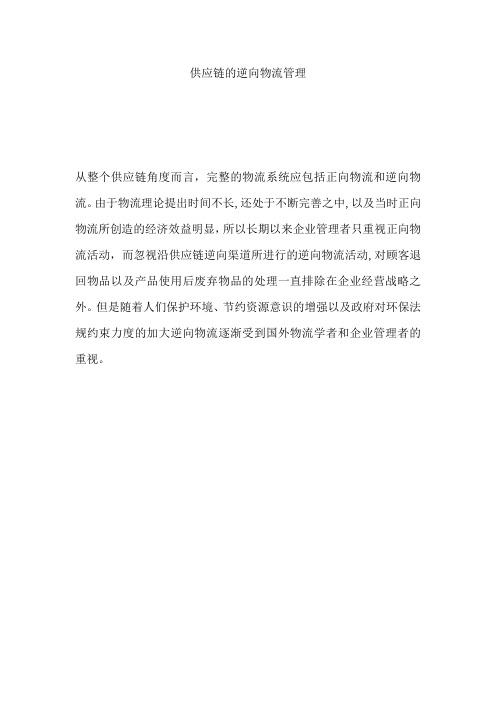
供应链的逆向物流管理从整个供应链角度而言,完整的物流系统应包括正向物流和逆向物流。
由于物流理论提出时间不长,还处于不断完善之中,以及当时正向物流所创造的经济效益明显,所以长期以来企业管理者只重视正向物流活动,而忽视沿供应链逆向渠道所进行的逆向物流活动,对顾客退回物品以及产品使用后废弃物品的处理一直排除在企业经营战略之外。
但是随着人们保护环境、节约资源意识的增强以及政府对环保法规约束力度的加大逆向物流逐渐受到国外物流学者和企业管理者的重视。
1逆向物流的内涵、构成及特点1。
1逆向物流的内涵“逆向物流”(ReverseLogistics)这个名词最早由Stock在1992年给美国物流管理协会(CouncilofLogisticsManagement)的一份研究报告中提出,他在报告中指出:逆向物流为一种包含了产品退回、物料替代、物品再利用、废弃处理、再处理、维修与再制造等流程的物流活动。
本文认为,逆向物流是指为了重新获取产品的使用价值或正确处置废弃产品的目的,而将原材料、半成品、制成品及相关信息由供应链下游的消费一端返回上游的生产一端的过程。
从定义可以看出,实施逆向物流的目的是重新获得产品的使用价值或者正确处置废弃产品;流动的对象包括产品、产品运输容器、包装材料及相关信息;同时,为了实现物流的目的必须对退回产品进行回收、分类、检验、拆卸、再生产及报废处理等活动。
1。
2逆向物流的构成逆向物流由退货逆向物流和回收逆向物流两部分构成。
退货逆向物流是指下游顾客将不符合订单要求的产品退回给上游供应商其流程与常规产品流向正好相反;回收逆向物流是指将最终顾客所持有的废旧物品回收到供应链上各节点企业。
物流系统示意图见图1.1。
3逆向物流的特点①逆向性.逆向物流中退回的商品或报废的物品的流动与正常的商品流的方向刚好相反,即从消费者→中间商→制造商→供应商。
②不确定性。
表现在逆向物流产生的地点、时间和数量是不确定的。
正向物流则不然,按量、准时和指定发货点是其基本要求。
逆向物流 毕业论文
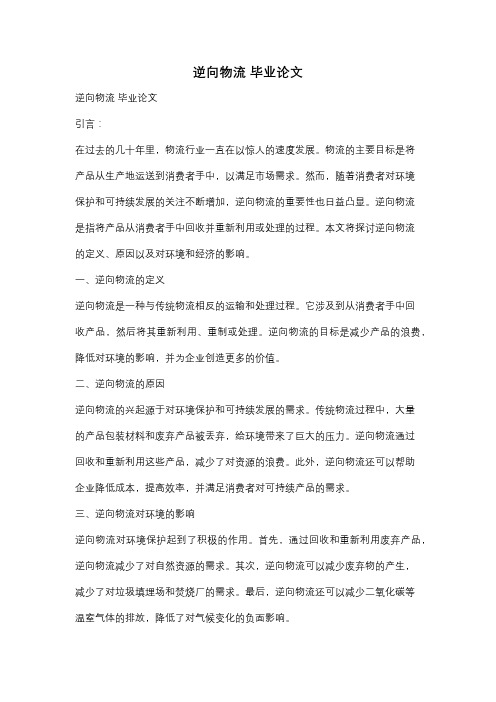
逆向物流毕业论文逆向物流毕业论文引言:在过去的几十年里,物流行业一直在以惊人的速度发展。
物流的主要目标是将产品从生产地运送到消费者手中,以满足市场需求。
然而,随着消费者对环境保护和可持续发展的关注不断增加,逆向物流的重要性也日益凸显。
逆向物流是指将产品从消费者手中回收并重新利用或处理的过程。
本文将探讨逆向物流的定义、原因以及对环境和经济的影响。
一、逆向物流的定义逆向物流是一种与传统物流相反的运输和处理过程。
它涉及到从消费者手中回收产品,然后将其重新利用、重制或处理。
逆向物流的目标是减少产品的浪费,降低对环境的影响,并为企业创造更多的价值。
二、逆向物流的原因逆向物流的兴起源于对环境保护和可持续发展的需求。
传统物流过程中,大量的产品包装材料和废弃产品被丢弃,给环境带来了巨大的压力。
逆向物流通过回收和重新利用这些产品,减少了对资源的浪费。
此外,逆向物流还可以帮助企业降低成本,提高效率,并满足消费者对可持续产品的需求。
三、逆向物流对环境的影响逆向物流对环境保护起到了积极的作用。
首先,通过回收和重新利用废弃产品,逆向物流减少了对自然资源的需求。
其次,逆向物流可以减少废弃物的产生,减少了对垃圾填埋场和焚烧厂的需求。
最后,逆向物流还可以减少二氧化碳等温室气体的排放,降低了对气候变化的负面影响。
四、逆向物流对经济的影响逆向物流不仅对环境有益,也对经济有积极的影响。
首先,逆向物流可以帮助企业降低成本。
通过回收和重新利用废弃产品,企业可以减少原材料和生产成本。
其次,逆向物流可以提高产品的价值。
通过重新制造或修复产品,企业可以延长产品的生命周期,并为消费者提供更多选择。
最后,逆向物流还可以创造就业机会。
回收和处理废弃产品需要大量的人力资源,为社会提供了更多的工作机会。
结论:逆向物流是一种与传统物流相反的运输和处理过程,它的兴起源于对环境保护和可持续发展的需求。
逆向物流通过回收和重新利用废弃产品,减少了对自然资源的需求,降低了废弃物的产生,并减少了温室气体的排放。
物流管理论文——逆向物流
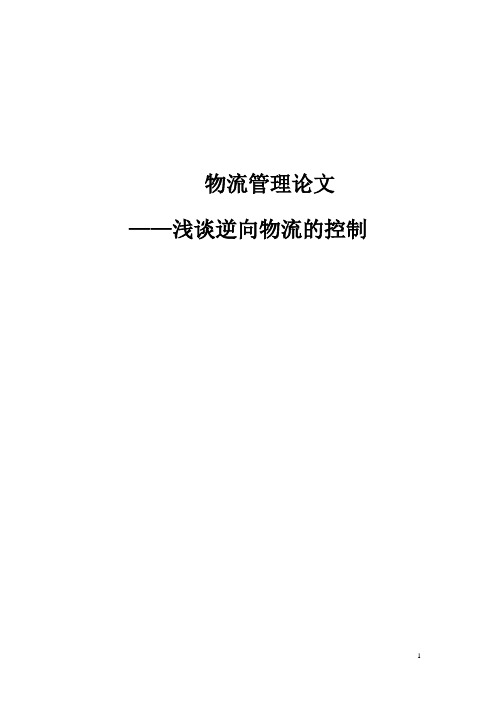
物流管理论文——浅谈逆向物流的控制浅谈逆向物流的控制一、逆向物流的内涵1、逆向物流的概念发到生产再到消费者手中,这一过程被称为正向物流。
但产品到达最终消费者之后还可产品从开能面临被退回,或者产品失去原来的使用价值之后如何处理的问题,所以一个完整的供应链应包括正向物理和逆向物流。
对于逆向物流并没有一个完备和公认的定义,经过比较我对逆向物流的理解是:为实现企业价值和社会目标,将原材料、中间库存、最终产品从目的地沿传统供应链反方向物理性流动的过程。
2、逆向物流的特点(1)逆反性。
即产品或报废产品通过逆向物流渠道从消费者流向经销商或生产商。
(2)价值递减性。
产品回收或退回产生的运输、仓储、处理费用会在一定程度上冲减产品原来的价值。
(3)报废产品的价值递增性。
报废产品对消费者虽然没有什么价值,但对生成商却不然,这些报废产品可以再次被投入生产,实现价值再造。
(4)信息传递失真性递增。
当产品从消费者手中退回时,产品的多级传递会造成信息失真,产生“牛鞭效应”。
3、逆向物流的主要组成部分逆向物流主要包括回收逆向物流和退货逆向物流两部分。
回收逆向物流是指将最终消费者所持有的已经失去原来价值,或需要一定价值,但需要经过修复方能再次投入使用的废旧产品,回收到供应链上个节点企业所形成的物流。
退货逆向物流是指处理供应链下游的消费者,将不符合其要求的产品沿供应链退回给上供应商所形成的物流。
从下图可以直观地看出回收逆向物流和退货逆向物流的流程。
正向物流 退货逆向物流 回收逆向物流二、退货逆向物流成熟市场中,经销商和消费者可以通过占有一定的市场优势,迫使供应商承担库存的风险和成本。
退货库存就是其中之一。
大的批发商可以将外包装受损的产品退还给生产商;大的零售商可以就货物的生产日期在收货时作严格的要求等等。
这些情况经常造成生产商的退货。
由此形成的退货本身及处理这些退货的活动都产生了不小的成本。
那么从逆向物流的角度该如何控制退货行为,尽量减低退货成本呢?我认为,应该从企业跨部门的整体战略角度考虑。
逆向物流管理论文
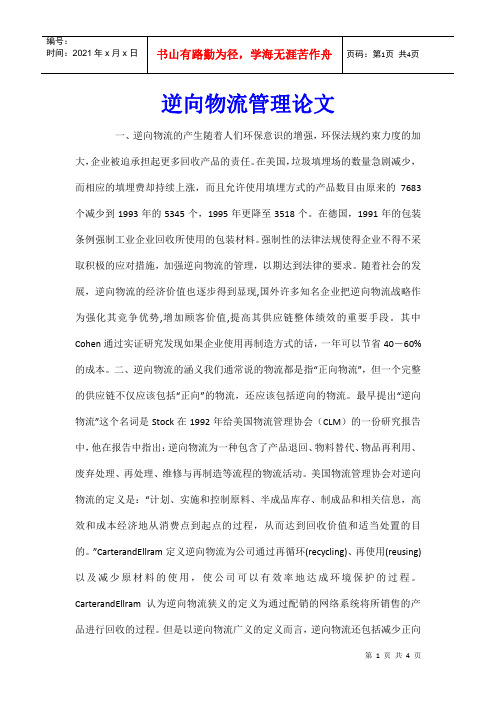
逆向物流管理论文一、逆向物流的产生随着人们环保意识的增强,环保法规约束力度的加大,企业被迫承担起更多回收产品的责任。
在美国,垃圾填埋场的数量急剧减少,而相应的填埋费却持续上涨,而且允许使用填埋方式的产品数目由原来的7683个减少到1993年的5345个,1995年更降至3518个。
在德国,1991年的包装条例强制工业企业回收所使用的包装材料。
强制性的法律法规使得企业不得不采取积极的应对措施,加强逆向物流的管理,以期达到法律的要求。
随着社会的发展,逆向物流的经济价值也逐步得到显现,国外许多知名企业把逆向物流战略作为强化其竞争优势,增加顾客价值,提高其供应链整体绩效的重要手段。
其中Cohen通过实证研究发现如果企业使用再制造方式的话,一年可以节省40-60%的成本。
二、逆向物流的涵义我们通常说的物流都是指“正向物流”,但一个完整的供应链不仅应该包括“正向”的物流,还应该包括逆向的物流。
最早提出“逆向物流”这个名词是Stock在1992年给美国物流管理协会(CLM)的一份研究报告中,他在报告中指出:逆向物流为一种包含了产品退回、物料替代、物品再利用、废弃处理、再处理、维修与再制造等流程的物流活动。
美国物流管理协会对逆向物流的定义是:“计划、实施和控制原料、半成品库存、制成品和相关信息,高效和成本经济地从消费点到起点的过程,从而达到回收价值和适当处置的目的。
”CarterandEllram定义逆向物流为公司通过再循环(recycling)、再使用(reusing)以及减少原材料的使用,使公司可以有效率地达成环境保护的过程。
CarterandEllram认为逆向物流狭义的定义为通过配销的网络系统将所销售的产品进行回收的过程。
但是以逆向物流广义的定义而言,逆向物流还包括减少正向物流中使用的物料数量,其目的是为了减少回收的物料数量和使产品能够再使用以及更方便地进行再循环处理。
狭义的逆向物流是指对那些已经废弃的产品再制造、再生以及物料回收的过程。
逆向物流 毕业论文
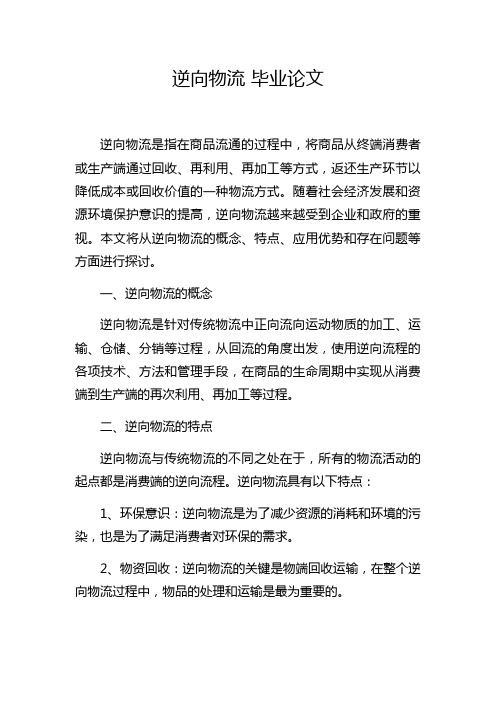
逆向物流毕业论文逆向物流是指在商品流通的过程中,将商品从终端消费者或生产端通过回收、再利用、再加工等方式,返还生产环节以降低成本或回收价值的一种物流方式。
随着社会经济发展和资源环境保护意识的提高,逆向物流越来越受到企业和政府的重视。
本文将从逆向物流的概念、特点、应用优势和存在问题等方面进行探讨。
一、逆向物流的概念逆向物流是针对传统物流中正向流向运动物质的加工、运输、仓储、分销等过程,从回流的角度出发,使用逆向流程的各项技术、方法和管理手段,在商品的生命周期中实现从消费端到生产端的再次利用、再加工等过程。
二、逆向物流的特点逆向物流与传统物流的不同之处在于,所有的物流活动的起点都是消费端的逆向流程。
逆向物流具有以下特点:1、环保意识:逆向物流是为了减少资源的消耗和环境的污染,也是为了满足消费者对环保的需求。
2、物资回收:逆向物流的关键是物端回收运输,在整个逆向物流过程中,物品的处理和运输是最为重要的。
3、多方参与:逆向物流需要多方参与,涉及到消费者、经销商、制造商和政府等多个角色。
4、复杂流程:逆向物流涉及到物品的拆解、卸货、运输、分类、再利用等一系列复杂的流程。
三、逆向物流的应用优势逆向物流不仅可以实现资源的回收再利用,而且可以带来以下优势:1、节约资源:逆向物流将有害废物转化为可用资源,节约了原有的可用资源,降低了生产成本。
2、减少环境污染:逆向物流通过回收和处理有害废物,减少了对环境的污染。
3、社会形象:企业通过逆向物流,不仅可以实现资源的再利用,还可以提高企业的社会责任感和良好的社会形象。
4、创造经济价值:逆向物流从垃圾中挖掘有用资源,降低了生产成本,创造了经济价值。
四、逆向物流的存在问题逆向物流虽然具有重要的应用价值,但在实际应用过程中也面临一些困难和障碍,主要包括以下几点:1、缺乏技术支持:逆向物流的技术和管理手段还不够成熟,需要加大技术研发力度。
2、产品质量问题:逆向物流回收的产品质量不如新产品,需要进行大量的维修和再加工,增加了成本。
- 1、下载文档前请自行甄别文档内容的完整性,平台不提供额外的编辑、内容补充、找答案等附加服务。
- 2、"仅部分预览"的文档,不可在线预览部分如存在完整性等问题,可反馈申请退款(可完整预览的文档不适用该条件!)。
- 3、如文档侵犯您的权益,请联系客服反馈,我们会尽快为您处理(人工客服工作时间:9:00-18:30)。
逆向物流论文我国逆向物流的发展现状和问题研究摘要逆向物流是一种包含了产品退回、物品再利用、废弃处理、维修和再制造等流程的物流活动。
逆向物流具有良好的生态效益和经济效益,是构建循环型经济的必然选择。
从微观上看,逆向物流具有提高顾客价值、增强竞争优势、降低物料成本、增加企业效益、改善环境行为、塑造企业形象等显性和隐性作用;从宏观上看,逆向物流有利于社会资源的合理流动、节约资源、改善环境和经济的可持续发展等。
21世纪人类要实现可持续发展一定要繁荣逆向物流,与正向物流一起形成一个完整的经济链条,才能逐步构建循环型经济,人类也才能获得真正的可持续发展。
逆向物流活动的实现需要全民的参与,上至法律法规的决策者,下至产品的消费者。
政府在制定法律法规时应注重引导企业加强逆向物流管理,以减少其产品带来的环境污染。
消费者在消费时要注重产品的绿色化和环保化,只有消费者的支持,实施逆向物流活动的企业最终才能获得经济效益,才能促进企业加强逆向物流管理。
企业在实施逆向物流活动时应加强逆向物流的正向控制,在产制环节就尽可能的减少产品的缺陷,从源头上减少逆向物流发生的可能性。
同时,企业应重视逆向物流系统及其网络结构的构建,协调各部门的活动,使流程通畅,从而提高逆向物流效率。
本文首先分析了逆向物流的发展背景和国内外的研究现状,进而论述了逆向物流的概念、分类、特征及其作用,重点阐述了企业实施逆向物流活动的决策过程及如何实施逆向物流管理,探讨了我国逆向物流的发展及其问题所在,并对我国企业如何加强逆向物流管理提出了建议。
关键词:逆向物流,SWOT分析,决策树分析An research into the present development and problems of reverse logistics in our countryAbstractReverse logistics is a kind of logistics activity consisting of product return, recycling, discarding, repairing and reproducing of commodities. Reverse logistics, providing ecological and economic benefits, is the essential choice of building circular economics. From the microscopic point, reverse logistics plays a dominant and recessive role in enhancing customers' value, strengthening the competitive advantages, reducing costs of materials, promoting businesses' benefits, improving environments, and shaping images of businesses. From the macroscopic point, reverse logistics is good for the reasonable flowing of social resources, saving sources, improving environment, the sustainable development of economics and so on. In the 21st century, human beings should prosper the reverse logistics and then make a complete economic chain with combination of the forward logistics in order to realize the sustainable development.The realization of reverse logistics needs the participation of all people, including policy-makers of laws and consumers. During the process of making laws, the government should attach importance to guiding businesses how to strengthening the management of reverse logistics so as to decrease the environmental pollutions brought by products. Whiling consuming, consumers should choose green products. Only with the help of consumers can the businesses operating the reverse logistics obtain economic benefits finally, and improve the management. In this course, businesses are supposed to strengthen the obverse control of reverse logistics, decrease deficient products as much as possible in the process of producing and reduce the possibility of reverse logistics at the very beginning. Meanwhile, they should pay much attention to building the system of reverse logistics and its networks, coordinate with various sectors tomake the process smooth.This paper makes an analysis of the development background and the present research of reverse logistics at home and abroad, elaborates its concept, specialization, features as well as effect and focuses on explaining how businesses make decisions in the process of operating reverse logistics activities and how they manage it in detail. Then, it also makes a discussion of our national development of reverse logistics and its problems and puts forward some suggestions of strengthening the management of reverse logistics in our country.Key words:reverse logistics, SWOT analysis, decision tree analysis目录摘要 (I)Abstract (II)一、绪论 (5)二、逆向物流的概述 (7)(一)逆向物流的概念及其发展的驱动因素 (7)1. 逆向物流的概念 (7)2. 逆向物流发展的驱动因素 (8)(二)逆向物流的分类 (9)1. 按回收产品的价值高低分类 (9)2. 按回收产品是否可再利用分类 (10)3. 按逆向物流作用不同分类 (10)(三)逆向物流的特征 (11)1. 逆向物流的复杂性 (12)2. 逆向物流的分散性 (12)3. 逆向物流的不确定性 (12)4. 逆向物流的缓慢性 (12)5. 逆向物流实施的困难性 (13)(四)逆向物流的作用 (13)1. 微观方面 (13)2. 宏观方面 (14)三、逆向物流的实施决策 (15)(一)企业实施逆向物流活动的决策流程 (15)(二) SWOT分析 (17)1. SWOT原理分析 (17)2. 逆向物流的SWOT战略选择 (18)(三)企业实施逆向物流活动的决策树分析 (20)四、逆向物流管理 (22)(一)构建逆向物流系统 (22)1. 系统功能模块 (22)2. 系统流程图及子流程图 (23)(二)逆向物流正向控制 (27)1. 运输 (27)2. 装卸搬运 (28)3. 仓储 (28)4. 流通加工 (28)5. 包装 (29)6. 配送 (29)7. 信息处理 (29)五、我国逆向物流的发展情况 (29)(一)我国逆向物流的发展 (30)1. 我国逆向物流的发展历程 (30)2. 我国逆向物流的发展现状 (31)(二)我国逆向物流管理存在的问题 (31)1. 供应链风险逐级扩大 (31)2. 经济利益与环境效益难以平衡 (31)3. 回收品业务与正常生产相冲突 (32)4. 缺乏逆向物流信息系统 (32)5. 缺乏资金和逆向物流人才 (32)六、企业实施逆向物流活动的建议及展望 (33)(一)企业实施逆向物流活动的建议 (33)1. 构建逆向物流系统 (33)2. 根据实际情况将正向物流与逆向物流分开或结合 (34)3. 实施时间管理,压缩各作业环节的无效时间 (34)4. 适时将逆向物流业务外包给第三方逆向物流企业 (34)5. 引进逆向物流人才 (34)(二)逆向物流的展望 (34)结论 (36)谢辞 (37)参考文献 (38)一、绪论物流在创造产品的时间效用和空间效用等经济效用时也对环境产生了影响,因此,物流涉及了经济与生态环境两大系统。
现代物流系统是一个开放的系统,在产生经济效益的同时也带来了社会效益。
当然,其效益有正也有负。
随着经济的快速发展,物流活动对生态环境的破坏越来越严重,如废气污染、噪音污染、资源浪费、交通堵塞、废弃物增加等。
自然界的资源是有限的,而随着人口的增加和经济的快速发展,人们对资源的需求不断的增加,这必然会产生资源的有限性和需求的增长性之间的矛盾。
